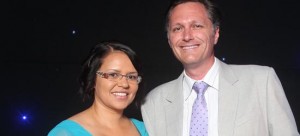
Jaqui’s father’s people are Wagedagam from Mabuiag Island in the Western islands of the Torres Strait, while her Mum’s side of the family hail from around Darwin. Jaqui grew up in Darwin, but studied medicine at the University of Newcastle in NSW, then trained further in Sydney before returning to Darwin where she is currently a nephrologist (kidney specialist) at the Royal Darwin Hospital and a researcher at the Menzies School of Health Research in Darwin, which specialises in Indigenous and tropical health.
The research for which Dr Hughes won her award dealt with obesity and the impact it has on the prevalence of diabetes and kidney disease in Aboriginal and Torres Strait Islander communities.
“The death rates from kidney disease are eight to 10 times higher among Indigenous Australians, who are also 14 times more likely to need in-hospital care for kidney dialysis,” she says.
With obesity and diabetes being key drivers of kidney disease in Indigenous Australia, Dr Hughes research focused on body composition.
“Indigenous Australians tend to accumulate fat around their mid-section, rather than other areas of the body, which could greatly influence kidney function,” she says.
What she found was that there were skeletal differences between Aboriginal and non-
Aboriginal people. Aboriginal people had longer legs and tended to be narrow between the shoulders and hips. One of the reasons for this is that it gives people a higher body surface area and that makes them more heat efficient. But what was once an advantage has become, in an age of sedentary lifestyles, a health risk. The reason why, Dr Hughes discovered, is that this skeletal shape makes people more prone to putting on body fat on the trunk of the body, which is the kind of fat with the inflammatory markers that have the greatest risk of causing diabetes and heart disease.
“The main thing about diabetes and why it’s such a big problem in Australia and all over the world, is that people have a tendency to develop diabetes and they don’t know it. It’s important to be proactive about your health-care and that includes going to get regular health checks,” says Dr Hughes. “If you have a body build that’s longer in the legs, you’re probably going to put on most of your body fat around your belly and that means you’re high-risk. The simplest way of becoming aware of this, she says, is to take a tape measure and put it around your waist.
Dr Hughes shares the main message from her research: “If you know people are high risk early in life, say in their early twenties, you have a lead time before things like diabetes and heart disease develop. You can encourage people to be pro-active about their health. Don’t wait for an illness to develop.”
Her advice for having healthy kidneys is to not smoke, be active, watch what you eat and how much you eat. “Portion size is a big problem for all Australians,” she says.
Winning the Young Tall Poppy Award was an important acknowledgement of her research. And the award wasn’t just open to an Aboriginal and Torres Strait Island person, or for research into Aboriginal and Torres Strait Islander issues. Young researchers in any field of science had the chance to win it.
Dr Hughes says she started on her path to medicine and becoming a kidney specialist when she was still a schoolgirl.
“When I was in high school there was a story in the Northern Territory about the delivery of the first dialysis machine to a remote community in the Tiwi Islands,” she says.
“The interesting thing about dialysis is when your kidneys don’t work enough, the poisons build up in your body and it makes you really sick, so for people who have severe kidney diseases, and who want to live, they should be able to have dialysis treatment in their own community. You should be able to get treatment and live where you want to live, but that’s not the case for a lot of people in the Territory, because dialysis is only offered in a few places. That was a key thing for me and I thought maybe I could make a difference by trying to help people with kidney disease or even stop kidney disease.”
For Dr Hughes, deciding to become a doctor had its challenges. It involved studying and living in different places to develop the necessary skills. “I don’t think it’s easy for anyone to make their mark. It takes a lot of hard work,” she says. “If you want to make your mark, go out there and believe in what you want to do and look for people to help you. That way you can get it done.”
And it’s worth it, she says. “Any young person who wants to make a difference to the community in whatever field they are in is wonderful and should be encouraged. If they want to do that by being a doctor that’s a really good opportunity to make a difference to people. I make a difference to people as a doctor on an individual basis through patient consultations, but I also believe I’m making a difference to the wider community through my research projects. I think it’s really good as a doctor, you know, you’re really in an honourable position in the community, it demonstrates that you can think on your feet about a wide range of processes and it’s a position of great responsibility and authority.
Comments are closed.